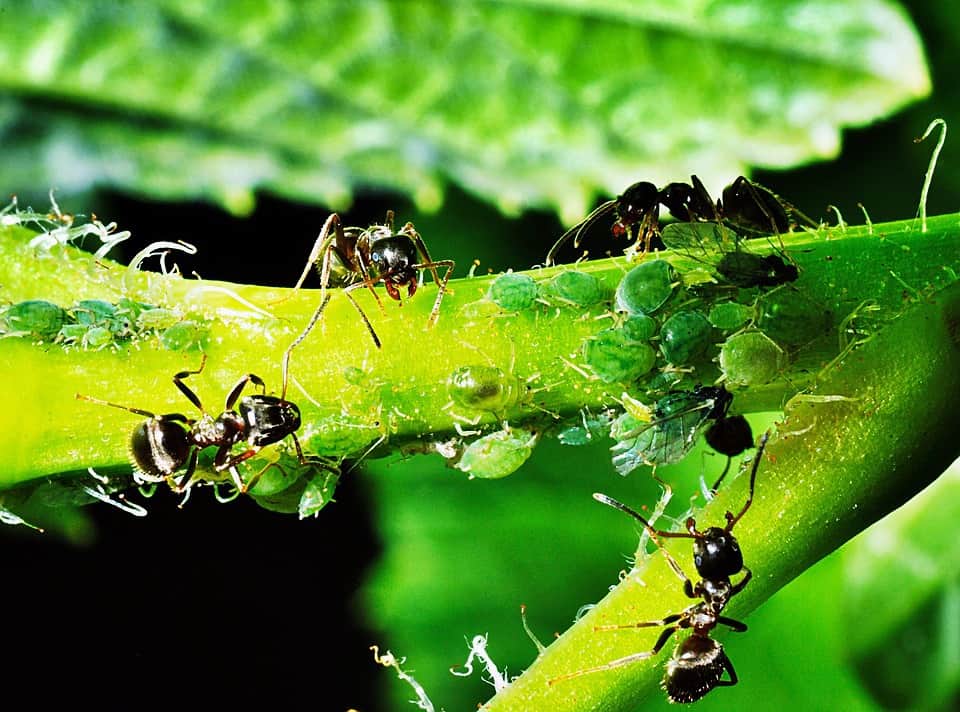The more you garden, the more perceptive you are about pests on your plants. Anything that doesn’t look like a bee or a spider is a suspect. So when you see ants crawling on your pepper plants, it’s natural to be concerned. But are ants on your pepper plants always a bad sign?
Fortunately, ants are usually not a serious concern for pepper plants, unless those same plants have aphids.
On this page:
Do Ants Eat Pepper Plants?
Ants don’t normally eat pepper plants. There is one exception, which are leafcutter ants. Leafcutter ants don’t eat pepper plants directly, but instead cut parts of the leaves and carry them to their colony where the leaves are used to grow a fungus. This fungus is then harvested by the ants to feed their larvae. The adult leafcutter ants may also drink some of the sap from the leaves.
The pepper fruits themselves are not a food source for ants while on the plant, although if a pepper falls to the ground and starts rotting, it’s not unusual to see ants on them (especially if ripe when they’re sweetest). In fact, your pepper fruits are more likely to be attacked by pepper maggot flies than ants.
When Should You Consider Ants a Problem for Your Peppers?
Ants become a concern when you notice they’re walking along your pepper plants which also have aphids. Aphids are pretty small, so you may need to look closely; they’re usually along the young branches and growing tips. Aphids can weaken older plants, stunt young plants, and even kill seedlings, overall reducing your pepper yields. If you see ants with aphids, the ants are protecting them.
The Ant-Aphid Connection: Explained
Ants are the world’s oldest farmers. When aphids suck the sap from pepper plants, especially the young, tender growing tips, they collect the sugary honeydew inside their bodies. Several ant species have developed a mutually beneficial symbiotic relationship with aphids, whereby the ants will protect and “herd” the aphids on your pepper plants and can feed on the honeydew secreted by the aphids. The way the ants “milk” the aphids for honeydew is not unlike how a farmer milks cows or sheep.
In fact, for those ant species that have this relationship with aphids, they have worker ants specialized in protecting and taking care of aphids. They will even carry aphids back to their colony in winter, and carry aphid eggs with them when moving to a new colony.
When you’re growing pepper plants, usually ants themselves are not the ones harming your plants, but the aphids they’re protecting.

Do Ants Kill Pepper Plants?
It’s very unlikely that ants alone will kill a pepper plant. Usually leafcutter ants will take a few leaves at a time.
If the ants are protecting aphids, they are a more serious problem, especially for young pepper plants. However, unless you have an extremely severe aphid infestation where they’re covering the whole plant, mature pepper plants won’t necessarily die, however, they will be weakened and have lower yields. It will also make them more susceptible to disease later in the season, which can end up killing your pepper plants.
How Do I Keep Ants off My Pepper Plants?
If your ants are a problem because they are protecting aphids, it’s easier to just deal with the aphid problem directly. Even heavy infestations of aphids on pepper plants are straightforward to fix. Minor infestations can be dealt with by simply blasting your pepper plants with a hose, which will wash away the aphids. Aphids by themselves are very clumsy and will have a hard time finding their way back to your pepper plants. For serious infestations, spray your pepper plants with soapy water, and then rinse with a hose. You can also use organic insecticidal soap or neem oil. Read more here about dealing with aphids on peppers.
Regardless of what you do to remove aphids, you will need to repeat it every few days until you see no more aphids.
To deal with ants directly, there are a few options. Some guides suggest sprinkling the soil around the base of your plants with cinnamon or other strong spices will deter ants, but I haven’t found this to be the case.
One trick which is a good preventive measure is to smear vaseline along the trunk of your plants (this works for peppers and other plants). Both ants and aphids will have difficulty climbing up the vaseline and may even get stuck, protecting the rest of your plant. Mark from Self Sufficient Me made a good video showing this in action:
You can also mix borax with powdered sugar, or stir it with honey and place it around your yard or near ant hills to reduce the ant population in your garden. The ants will carry both the borax and sugar together and feed them to their young, as well as eat it themselves, decimating their colony.
Take Home Message
Ants alone are not a serious problem for peppers, but if you do see ants in conjunction with aphids, this could be a sign of a serious problem. Deal with the aphid problem directly or use preventive measures like reducing the ant population with borax and powdered sugar traps, or smearing vaseline along the base of your pepper plants.
